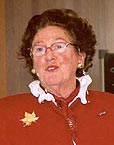 |
[ZAWiW] [gemeinsamlernen] [LiLL] | ||
|
Page 1 of 2
|
||
| home | ||
|
|
Results Arnhem | |
 |
||
Results Arnhem
Stand:Bread survey.
 |
Hannie Pelleboer-Beuker |
General information.
| Number of lists: | 18. (7 lists have been filled in by men, 11 lists by women) |
| Ages of interviewees: | 4 people between 70
and 80 10 people between 60 and 70 4 people between 50 and 60 |
| Professions: | Most of interviewees
had higher vocational education and some had an academic background.
|
| Places of birth: | 10 people were from
the western part of The Netherlands 2 from the central part of the country and 5 from the northern part 1 person was born in Indonesia (former Dutch colony Nederlands-India) |
Question 1. Sorts of bread.
a. In the Netherlands most people had white and occasionally wheat bread in their childhood.White bread usually consisted of just flour with water. In some cases people had currant bread and rarely rolls.
b. When people were asked – which bread do you prefer? – they answered wheat bread or wholemeal bread. Most people like eating wholemeal bread. Many campaigns have been held against white bread because it can lead to constipation and it is less healthy.
c. About eating other kinds of bread from other countries – 4 people
hardly ever eat bread from other countries, the others like French baguettes (very
popular), Turkish bread (there are many Turkish bakers in Holland), German
leavened bread (sour-dough bread) or the Italian ciabatta. French bread is often
eaten with a hot meal or soup.
Question 2. The value of bread in people’s lives.
a. What is the value of bread in people’s lives?
People value bread very much firstly because of the unrivalled nutritional value.
Secondly: bread can easily be taken with you for lunch, for a picnic or while
travelling.
b. Can people live without bread?
People in western society cannot live without bread. In Asian countries rice is
essential (it must be cooked first).
Question 3. Availability or shortage of bread.
Many things have changed during this last decade and this is for the greater
part the effect of WWII. In the past the baker called on people daily – they
didn’t have to go to the baker’s shop and had fresh bread every day.
Every interviewee mentioned WWII and referred to the big shortage of bread.
People were half starved and travelled from the western part of the country,
where the big cities were, to the eastern part just to get some bread and they
even exchanged precious goods for bread.
The farmers had little bread themselves because they were checked by the
occupying forces after they had harvested the crops. Farmers were only allowed
to keep a very small part for themselves. (Usually they kept back more corn than
was allowed.)
This period of WWII and in particular the winter of starvation will never be
forgotten by the senior citizens and stories about their hardship will be told
to the next generations.
